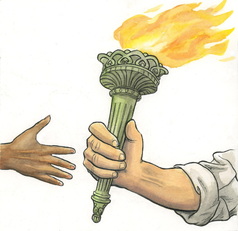Passing the Torch

Each grade passes the torch to those who follow.
It is tradition every year that each grade provides advice and tips to the grade below, whether it is which classes not to take, what clubs to join, or even what attitude to have. Some of this advice even goes unspoken, as people watch the grade above them and get tips without even having to ask, learning from the experiences of their older peers. Juniors get ideas on where to apply to college through the acceptances and advice of the graduating seniors. Sophomores hear from juniors all about which SAT and ACT tutors to get, and which classes to never take. They hear from the juniors about how it will be the hardest year of their entire high school career, and how they should try not to overload on work and classes. Meanwhile, the freshmen tell all of their middle school friends that this is the year that their work finally begins to really count, and that everything from this point forward determines your future. Of course, the middle schoolers don’t actually listen. And so it goes, as the school year comes to a close, students are taking everything they have learned throughout the year and passing it on to their younger peers, hoping they won’t make the same mistakes and instead make new ones of their own.
Lucas Kohen of the class of 2019 said that some unspoken advice he knows of is to respect the teachers and peers you see every day. He was told by the grade above him to make sure he doesn’t fall behind in class and just keep up with all his work. When asked what advice he would give to incoming freshmen, he said he would advise them to pay close attention to homework grades, because they have more of an effect on overall grades than one might think.
Sophomore Max Sochacki said that some of the best advice he received was to stay organized with his schoolwork and integrate himself into the MCDS community by joining clubs and doing extracurricular activities. By joining the Thespian Club, Max found something he enjoys doing and also met new friends he never would have gotten to know otherwise. He feels that following that advice helped him excel. The advice he had to give to incoming sophomores was to become friends with people across grades, not just their classmates, so that they can have multiple people to ask for help or rely on in different situations. Antonia Teixeira, also part of the class of 2018, said that the best advice she received was to balance her grades with everything else in her life, which she said helped her avoid too much stress in her daily life. She advised people to make sure they will put in the effort when taking an honors or AP level class, as it proves counterproductive to take a higher level course just because it looks good and then struggle all year to keep up with it. Sophomore Luna Aros also said similar words, reminding students to focus on classes they enjoy rather than just what looks good on their transcripts. She also advised her peers to find a service project that matters to them and stick with it throughout high school, to be able to have a bigger impact. Before her sophomore year, she was told that this year would be the year that everything really starts to matter for her future, and, in her opinion, that advice helped her take her studies more seriously this year and understand the responsibility she gained.
Juniors are used to hearing from everybody around them how important and difficult junior year is, but that everything gets easier once you get through it. Also, junior year brings more freedom and responsibility, as students are able to choose more of their classes based on interest rather than requirement and are treated with more maturity. Sasha Bhardwaj, from the class of 2017, said he did not receive a lot of advice before his junior year, but that he did learn along the way how to handle having multiple AP classes and realize that it is more important to make sure you can handle your classes than to have a bunch of AP classes you are struggling with. Sasha also had some advice to give to his fellow juniors for their senior year: “It’s common knowledge that senior year is the most laid back year in highschool. The ability to keep up with a heavy AP schedule gets smaller as the year progresses.” Therefore, it’s important for seniors to consider the classes they take and whether they will be able to keep up with them all year, despite the unavoidable senioritis. Katerina Filpi, also of the class of 2017, insisted on the importance of time management junior year. “Do your work the day it is assigned. It may be hard in the beginning but always pays off in the end.” Procrastination is something many high schoolers struggle with, but overcoming the need to avoid work can transform the school experience.
Finally, one of the most significant changes in a high schooler’s career is the change from junior to senior, and finally experiencing senior year, the last (and best) year of high school. Vicky Giacian, of the class of 2016, stressed the importance of understanding how important grades in high school are before your junior year, rather than waiting until then to take school seriously. “Work as hard as you can from the start because even 9th grade counts.” She also mentioned the significance of paying attention to GPAs, and how she had to work very hard senior year to get the GPA she wanted to finish high school with. Graduating senior Chris Haefner said that the advice he received before his senior year was basically to apply to as many colleges as possible and not slip up second semester because, although not often, some colleges do take back acceptances if students fail to continue to perform well. The advice he had was to gather ideas about what colleges you want to apply to before senior year, so as to avoid being overwhelmed and making hasty decisions. Also, he said it is important to not only apply to a reach school that you have some chance of getting into, but also to make sure to apply to at least two safety schools, just in case. The advice he had for every grade was to just balance everything out. “You don’t want to solely party and socialize and forget about school because, trust me, you will forget everything you learned the years before.” Lastly, he touched on the importance of creating bonds with the people we have all grown up with, as many of us will lose touch after high school. “Don’t get involved in pointless drama, and just enjoy senior year and every year as much as possible.”







Mr. BRONISH • Jun 2, 2016 at 9:52 pm
I truly appreciate the comments by students who spoke about taking courses because they are interested in them versus taking them because it may look good on a transcript. It is also important for you to hear these things from one another not just adults. I also like the comments about all years counting but i would add that while middle school years serve a different purpose in your education years, what you do with your time in the middle school establishes the basis for how quickly (or not) a student adapts to being successful in high school so using middle school for this purpose does make it count. I hope that many who read this article take these comments to heart. Good job Photini!